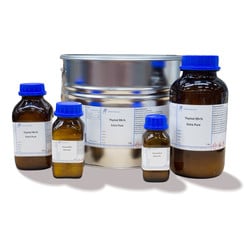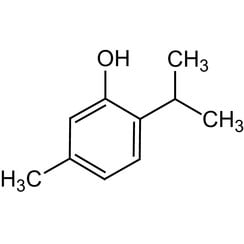You have no items in your shopping cart
Thymol
Thymol (also known as 2-isopropyl-5-methylphenol, IPMP) is a natural monoterpenoid phenol derivative of cymene, C10H14O, isomeric with carvacrol, found in oil of thyme, and extracted from Thymus vulgaris (common thyme), Ajwain[3] and various other kinds of plants as a white crystalline substance of a pleasant aromatic odor and strong antiseptic properties. Thymol also provides the distinctive, strong flavor of the culinary herb thyme, also produced from T. vulgaris.
Thymol has been used in alcohol solutions and in dusting powders for the treatment of tinea or ringworm infections, and was used in the United States to treat hookworm infections. People of the Middle East continue to use za'atar, a delicacy made with large amounts of thyme, to reduce and eliminate internal parasites.[citation needed] It is also used as a preservative in halothane, an anaesthetic, and as an antiseptic in mouthwash. When used to reduce plaque and gingivitis, thymol has been found to be more effective when used in combination with chlorhexidine than when used purely by itself. Thymol is also the active antiseptic ingredient in some toothpastes, such as Johnson & Johnson's Euthymol. Thymol has been used to successfully control varroa mites and prevent fermentation and the growth of mold in bee colonies, methods developed by beekeeper R. O. B. Manley. Thymol is also used as a rapidly degrading, non-persisting pesticide. Thymol can also be used as a medical disinfectant and general purpose disinfectant.


